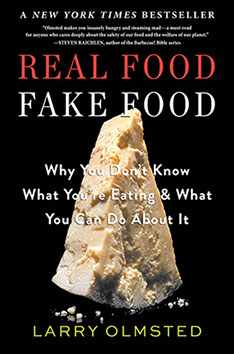NYT Best-seller Illustrates How Trademarks Can Become Meaningless
 I’m pleased to report that excerpts from a 2011 STL post appear in the 2016 NYT best-seller, “Real Food/Fake Food.”
I’m pleased to report that excerpts from a 2011 STL post appear in the 2016 NYT best-seller, “Real Food/Fake Food.”
Author Larry Olmsted riffs on my discussion about “American” Kobe beef. I like what he’s done.
The point of the post, and one of the points of the book, is that marketing labels stop meaning anything when they are stretched beyond their original designations. Kobe beef is a case in point. It used to designate special (and especially tasty) beef raised in Kobe, Japan. But when it shows up on menus as “American” Kobe beef, and the U.S. Patent and Trademark Office allows different producers to register trademarks like “AMERICAN STYLE KOBE BEEF,” “AMERICAN CERTIFIED KOBE BEEF,” and “PREMIER AMERICAN KOBE BEEF,” the Kobe beef designation no longer means what it used to. Indeed, it arguably no longer means anything at all.
This is a good example of how a strong trademark can lose its power. When other producers co-opt a brand, and give it their own twist, consumers eventually no longer think of the original trademark owner. Eventually, they may not think of anything.
If Kobe beef can come from producers in the States, what does it mean to say it’s Kobe beef?
Trademark owners should learn from this lesson. If you don’t stop others from using your trademark, you eventually can lose the equity you worked so hard to build up in your brand.
Reader Comments